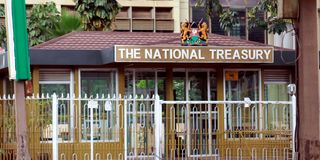
The National Treasury Building in Nairobi. Households and businesses are sweating as government’s tax burden keeps growing by the day.
The government has intensified its assault on households and businesses through multiple levies as part of an ongoing revenue-generating effort to finance growing expenditure requirements, largely related to debt repayment and operations.
National Treasury Cabinet Secretary Njuguna Ndung’u through the Budget Policy Statement 2024 says the new measures are meant to ensure that government ministries, departments, and agencies (MDAs) mobilise more revenues to be self-sustaining and to reduce over-reliance on the exchequer.
“The government has also scaled up efforts on requiring the various ministries, departments, and agencies to not only mobilise more non-tax revenues but also transfer resources to the exchequer. Eventually, the majority of the MDAs are expected to be self-financing,” says Prof Ndung’u.
“These policy strategies are expected to expand the primary surplus in the fiscal framework and stabilise the growth of public debt thereby boosting the country’s debt sustainability position.”
Last week the National Treasury published new regulations, which introduced a new tax for government suppliers known as capacity building levy charged at a rate of 0.03 per cent of the total value of supplies to the State with the overall effect of raising the cost of acquiring government contracts.
The new levy, according to the National Treasury, will be used to collect funds for purposes of funding the development of capacity through training, technical support, and mentoring of persons involved in the public procurement and asset disposal system and facilitate achievement of value for money in public procurement and enhance the quality of public service.
In February, the government raided the pockets of fuel consumers by tripling the tax payable to the Energy and Petroleum Regulatory Authority (Epra) for every litre of the commodity purchased.
The Ministry of Energy increased the Petroleum Regulatory Levy to Sh0.75 per litre up from Sh0.25.
The levy is one of the nine taxes and levies that are charged on fuel and has been increased to fund operations of the energy regulator.
The others are excise duty, Road Maintenance Levy, Petroleum Development Levy, Railway Development Levy, Anti-Adulteration Levy, Merchant Shipping Levy, Import Declaration Fee, and Value Added Tax (VAT). Energy Cabinet Secretary Davis Chirchir published the Energy (Energy and Petroleum Regulatory Authority Petroleum Levy) Regulations, 2024 that gave effect to the new change on February 15, 2024.
The increase in the petroleum levy means consumers will pay more at the pump.
In November last year, the National Treasury introduced a regulatory fee on online forex brokers, opening an extra revenue stream for the Capital Markets Authority (CMA).
In changes to online forex trading regulations, Prof Ndung’u said brokers would now be required to remit an annual fee to the regulator.
“The Capital Markets (Online Forex Exchange Trading) Regulations, 2017, hereinafter referred to as the “principal Regulations”, are amended by inserting the following new regulation immediately after regulation 25,” Prof Ndung’u said. “An online forex broker shall pay to the authority an annual fee based on the gross trading revenue which shall include the commissions and rebates from third-party related service providers for that year, at the rate specific in the Third Schedule,” he said.
According to the new regulations, both dealing and non-dealing online forex brokers will remit an annual three per cent fee to the CMA, based on their gross revenue and including commissions and rebates.
An analysis by the CMA shows that the new levy will net about Sh24.86 million going by the Sh828.81 million gross trading revenue realised by the six online forex traders in 2022.
On March 1, 2024, the government implemented revised fees for some of its services including passports, IDs, birth certificates, and work permit applications in a move that doubled or increased the fees for some of the services.
Among the new changes include an increase in the cost of issuing new birth certificates to Sh200 from Sh50, similar to the issuance of the death certificate, while late registration of a birth certificate now costs Sh500 up from Sh50, similar to late registration of a death certificate.
Amendment fees for both certificates increased by Sh870 to Sh1,000
Foreign registration of births and deaths at Kenyan missions abroad will cost $150, up from $50.Replacing an ID card now costs Sh1,000. It used to cost Sh100. The cost of changing details on an ID remains the same at Sh1000.
The cost of applying for a standard 34-page passport has jumped from Sh4,500 to Sh7,500.
According to the new rates, a 50-page ordinary passport will now cost Sh9,500, up from Sh6,000, while the application fee for a 66-page ordinary passport has shot up from Sh7,500 to Sh12,500.
The latest proposals before Parliament propose to increase various fees and levies charged on land transactions and services.
According to the National Treasury, the government is seeking to deploy diverse methods for domestic resource mobilisation to support the implementation of various ongoing government programmes.
The National Treasury has embarked on redesigning the taxation instruments with hopes of boosting revenue collection and raising tax effort from the current 16 per cent of gross domestic product (GDP) in the 2023/24 financial year to where it was previously, above 20 per cent of GDP.
“The tight fiscal stance is expected to reduce debt vulnerabilities through the implementation of reforms to broaden the domestic tax base and improve tax compliance,” says the Treasury.
“Expenditure rationalisation will continue to focus on enhanced efficiency of public investments, better targeting of subsidies and transfers, addressing weakness in state corporations, and digital delivery of public services. Social safety nets and fiscal risk management framework will be enhanced.”












